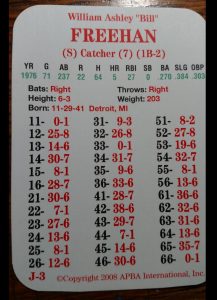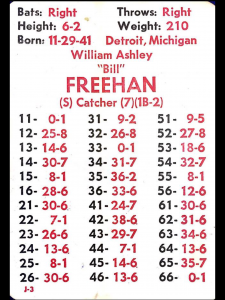One could easily claim that Bill Freehan was the best catcher in the American League during the 1960s. Freehan was an eleven-time All-Star who won five Gold Gloves. He was the American League All-Star starting catcher from 1966-1972. You could also claim that Bill Freehan was the best catcher in ALL of baseball during the 1960s, though that honor should probably go to Joe Torre.
Elston Howard would be Freehan’s closest competition for the title of best AL catcher in the 1960s. Taking over the primary catching duties for the Yankees in 1960, Howard put up some great numbers between 1961 and 1964. However, his effectiveness fell off sharply starting in 1965, and by 1967 Howard was a below average catcher. For the 1960s, Howard produced a 21.4 WAR, while Bill Freehan produced a 24.8 WAR between 1961 and 1969. Basically, Howard dominated the early part of the decade, while Freehan rose to the top in the second half.
Freehan’s greatness is minimalized by the dominant pitching of the mid to late 1960s. Sure, if you look at Freehan’s 1967 (.282-20-74) and 1968 (.263-25-84) seasons, you’ll see some pretty numbers for a catcher, however, they don’t appear to be earth-shattering. When taken in context, however, they are tremendous. Freehan produced a 6.1 WAR in 1967 and a 7.0 WAR in 1968. In 1967, he was the sixth in the AL in WAR; in 1968, he was third…and he was a catcher. This led to Freehan finishing third in 1967 and second in 1968 in the MVP balloting. Freehan maintained his position as one of the top AL catchers into the 1970s. He posted excellent seasons in 1971 and 1974. However, fifteen years of wear and tear behind the dish caught up with him, and he turned over the reins as best AL catcher to Carlton Fisk and Thurman Munson.
Bill Freehan was born in Detroit and was a multi-sport star at an early age. After high school, he attended the University of Michigan where he played football (end and linebacker) and stared in baseball. In 1961, he set the Big Ten Conference batting mark when he hit .585. That same year, he signed with his hometown Detroit Tigers and received a $100,000 bonus. Freehan got into four games with the Tigers in 1961 and went four for ten. However, the Tigers figured the 19-year needed seasoning, so he spent 1962 in the minor leagues. Bill was back in 1963 and the 21-year old was there to stay for the next fifteen years.
| Split | G | GS | PA | AB | R | H | 2B | 3B | HR | RBI | SB | BB | SO | BA | OBP | SLG | OPS | HBP | SH | SF |
|---|---|---|---|---|---|---|---|---|---|---|---|---|---|---|---|---|---|---|---|---|
| 1976 Totals | 71 | 64 | 255 | 237 | 22 | 64 | 10 | 1 | 5 | 27 | 0 | 12 | 27 | .270 | .303 | .384 | .687 | 1 | 1 | 4 |
Bill Freehan’s final APBA card is productive. However, gone were the days when he was an (F) Catcher (9). Nonetheless, this card(s) would be reliable in a league or replay. As a matter of fact, it’d probably be more productive than it should be. In my search for a photo of this final card, I received an original printing version from Larry Stein and Tom Laurin. I also received a 2008 printing version from Jim Henry. At first glance, they look very similar. However, there are some subtle differences. Most notably, the newer version has an extra 8. I project the original version to produce a .265 to .281 average…which seems accurate. However, with the extra 8, I project the 2008 version to produce a .288 to .306 average. The reason there’s such a range in performance is that both of these cards have a 36 & 38. As you know, both of those result numbers frequently result in a re-roll of some sort and not an out for the batter. One thing that’s missing from this card, that Freehan cards frequently possessed, is a 42. Freehan was hit by 114 pitches in his career and led the AL three times.
After retiring, Freehan coached with the Tigers, color commentated on television broadcasts, and coached the University of Michigan baseball team from 1989 to 1995. In recent years, he’s been suffering from the effects of Alzheimer’s, which some believe was precipitated from concussions he received as an athlete. Freehan’s condition spurred his grandson, Blaise Salter, to retire from professional baseball after his second concussion. As his condition has worsened, Freehan has stayed out of the public spotlight.
Probably the only thing that would bring Bill Freehan back into the limelight would be the remote chance he was to be inducted into the Baseball Hall of Fame. There are several reasons for his snub when he showed up on the 1982 ballot. First, he had to fight for space on the ballot with first-timers Frank Robinson and Hank Aaron and several other strong hold-over candidates like Harmon Killebrew and Juan Marichal. In all, the 1982 Hall of Fame ballot had 14 players on it that would be inducted into the Hall of Fame. Second, Freehan retired when he was 35-years old and played just 15 seasons.
Yet, there is still a strong case for Bill Freehan’s Hall of Fame candidacy. Jay Jaffe has developed a system for measuring Hall of Fame candidates called JAWS. Basically, JAWS is a combination of WAR and 7-year peak WAR which is then compared against players at the same position. JAWS does an excellent job of giving players, like Freehan, credit for playing in a challenging offensive era. Of the 15 Hall of Fame catchers, Freehan is 18th in WAR and 15th in 7-year peak WAR. Those numbers place him 15th in Jaffe’s JAWS ranking, ahead of Hall of Fame catchers like Buck Ewing, Ernie Lombardi, Roger Bresnahan, Roy Campanella, Ray Schalk, and Rick Ferrell. In many ways, Bill Freehan was a 1960s version of Buster Posey. I hope that the Baseball Hall of Fame Golden Days (1950-1969) Committee reconsiders Bill Freehan when it votes in 2020. He is deserving of a plaque in Cooperstown.





